Themen dieses Blogartikels:
Table of contents
- Is sugar healthy? What it does to the body & how much you need
- How much sugar do we consume and how much does the body need?
- What is sugar?
- Sweetness: How sweet does sweet taste?
- The sugar paradox: Why we need sugar and why it's still unhealthy
- The importance of glucose
- What happens to sugar in the body?
- How sugar affects blood sugar and insulin levels
- Why you need sugar in moderation
- Risk factor sugar: Why high sugar consumption can make you sick
- More on the topic of sugar and reducing consumption
- Sources & Bibliography
Healthy sugar - is it possible?
Optimal sugar provides your body with fuel, has no aftertaste and no negative effects on your well-being. However, most currently known sugars, sweeteners or sugar substitutes in the sugar industry do not offer all of this.
They are often difficult to process, the taste is not convincing, or they carry the risk of affecting blood sugar levels, promoting the development of diabetes, obesity and other diseases and encouraging addictive behavior. So what is the best alternative?
“The best alternative to sugar is: less sugar” - Stefan Kabisch, study doctor at the German Institute of Human Nutrition Potsdam-Rehbrücke.
However, this recommendation is difficult for many people to implement in everyday life. Sugar is not only hidden in chocolate and snacks: sugar is found in almost every ready-made product and many other foods, such as bread, fruit, honey or fruit yoghurt, and in drinks such as soft drinks and juice.
How much sugar do we consume and how much does the body need?
Per capita consumption in the 2022/23 marketing year was 33.2 kilograms of sugar.1 This corresponds to an amount of 91 grams per day .
These are the recommended amounts of sugar:
- The German Nutrition Society (DGE) recommends that consumers make sure they get a maximum of 10 percent of their energy from sugar. At 2,000 kilocalories per day, this corresponds to a maximum sugar intake of 50 grams, or roughly ten teaspoons.
- This recommendation is also made by the German Obesity Society and the German Diabetes Society.
- The WHO even advises limiting sugar consumption to 5 percent, i.e. a maximum of 25 grams per day.
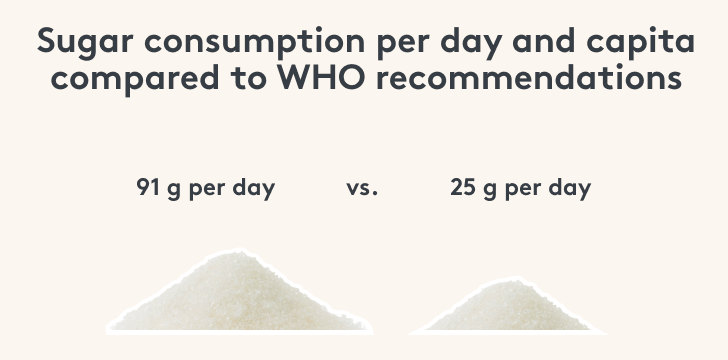

There is a large gap between actual and recommended consumption, which you can close with a conscious diet. But first, let's look at why you should keep an eye on your sugar intake and reduce it, but not stop it completely. After all, sugar is an important fuel that your brain and muscles need.
What is sugar?
When you think of sugar, you probably immediately think of a sweet taste. The sources for this are wide-ranging. The most common sources of sugar include
- Glucose (dextrose)
- Fructose (fruit sugar)
- Lactose (milk sugar)
- Sucrose (household sugar)
These types of sugar belong to the group of carbohydrates and have a similar chemical structure: they consist of carbon, hydrogen and oxygen. The molecular structure of the sugars differs depending on the type of sugar.
Carbohydrates are divided into different groups according to size:
- Simple sugars: Simple sugars such as glucose, galactose and fructose are called monosaccharides (simple sugars)
- Disaccharide: The household sugar sucrose is a disaccharide (disaccharide) and consists of equal parts glucose and fructose. Other disaccharides are lactose and maltose
- Polysaccharides: Carbohydrates contained in cereals and vegetables that are made up of three to nine monosaccharide molecules are called oligosaccharides (polysaccharides)
- Polysaccharides: The longest carbohydrates are called polysaccharides (multiple sugars). They taste less sweet and are contained in starch
Süßkraft - wie süß schmeckt süß?
Glucose is essential in the body and must be available around the clock. This is why the body has its own energy stores. The body can also produce glucose from fat and protein. A glucose supply via the diet is not absolutely necessary. The simple sugar serves as a building material for our cells, is a signal carrier and supports cellular repair. It is also an ideal fuel for our muscles and brain.
Another advantage of generating energy from sugar is its utilization. Unlike fatty acids, sugar can be burned with the help of oxygen and also fermented without oxygen. This was an important mechanism for our ancestors when hunting and fighting for survival. Today, many athletes such as marathon runners use this ability to run long distances. This can be an advantage in sport.
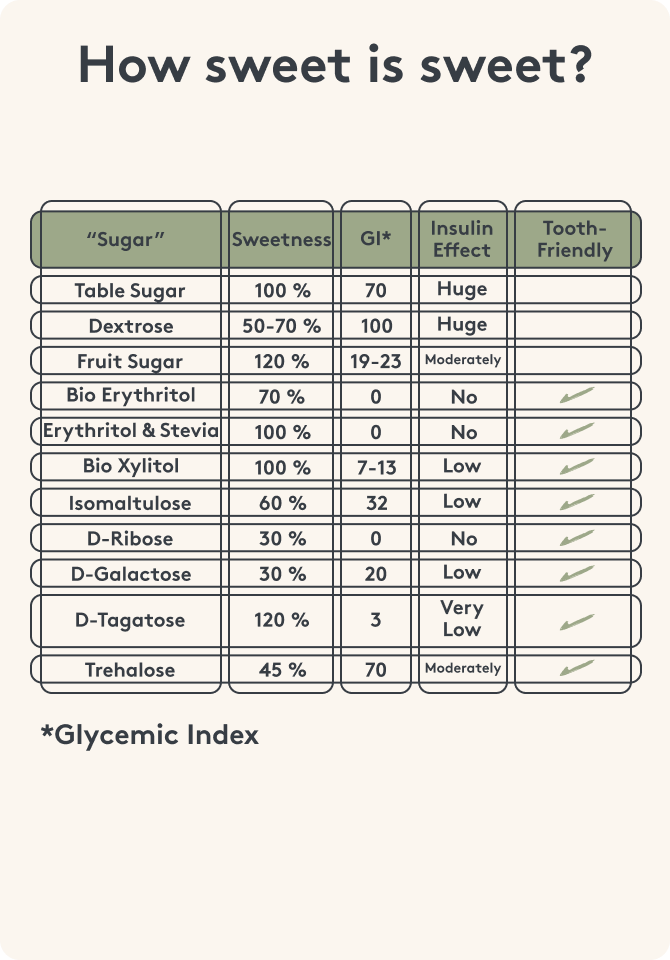
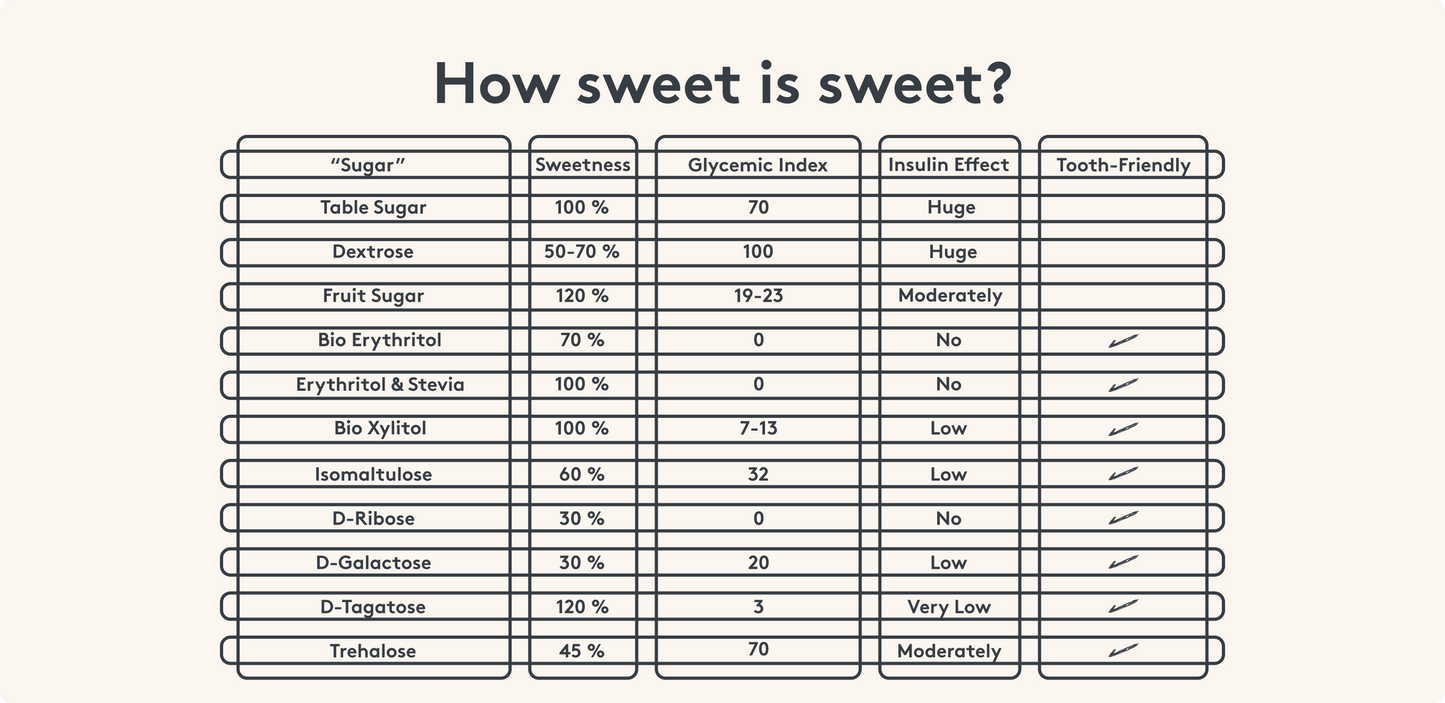
The sugar paradox - why we need sugar and yet it is unhealthy
Your body needs energy to function. The most important source of this is food. The nutrients contained in juice, fruit, honey or muesli - fats, proteins and carbohydrates - serve as fuel. In the history of human evolution, food consisted mainly of fats, proteins and fiber.
It was only with agriculture that there was a switch to a carbohydrate-rich diet. However, the metabolism of Central and Northern Europeans in particular has not yet adapted to this high amount of sugar.² The paradox: despite this, sugar in the form of glucose is one of the most important substances for the body.
Die Bedeutung von Glukose
Glucose ist im Körper essentiell und muss rund um die Uhr zur Verfügung stehen. Deshalb gibt es körpereigene Energiespeicher. Außerdem kann der Körper Glukose aus Fett und Eiweiß herstellen. Eine Glukosezufuhr über die Ernährung ist nicht zwingend notwendig. Der Einfachzucker dient als Baustoff für unsere Zellen, ist Signalträger und unterstützt die zelluläre Reparatur. Außerdem ist er ein idealer Treibstoff für unsere Muskeln und das Gehirn.
Ein weiterer Vorteil bei der Energiegewinnung aus Zucker ist dessen Verwertung. Anders als bei Fettsäuren kann Zucker mithilfe von Sauerstoff verbrannt und zusätzlich ohne Sauerstoff vergärt werden. Dies war für unsere Vorfahren ein wichtiger Mechanismus bei der Jagd und im Überlebenskampf. Inzwischen nutzen viele Sportler wie Marathonläufer diese Fähigkeit, um lange Strecken laufen zu können. Im Sport kann dies von Vorteil sein.
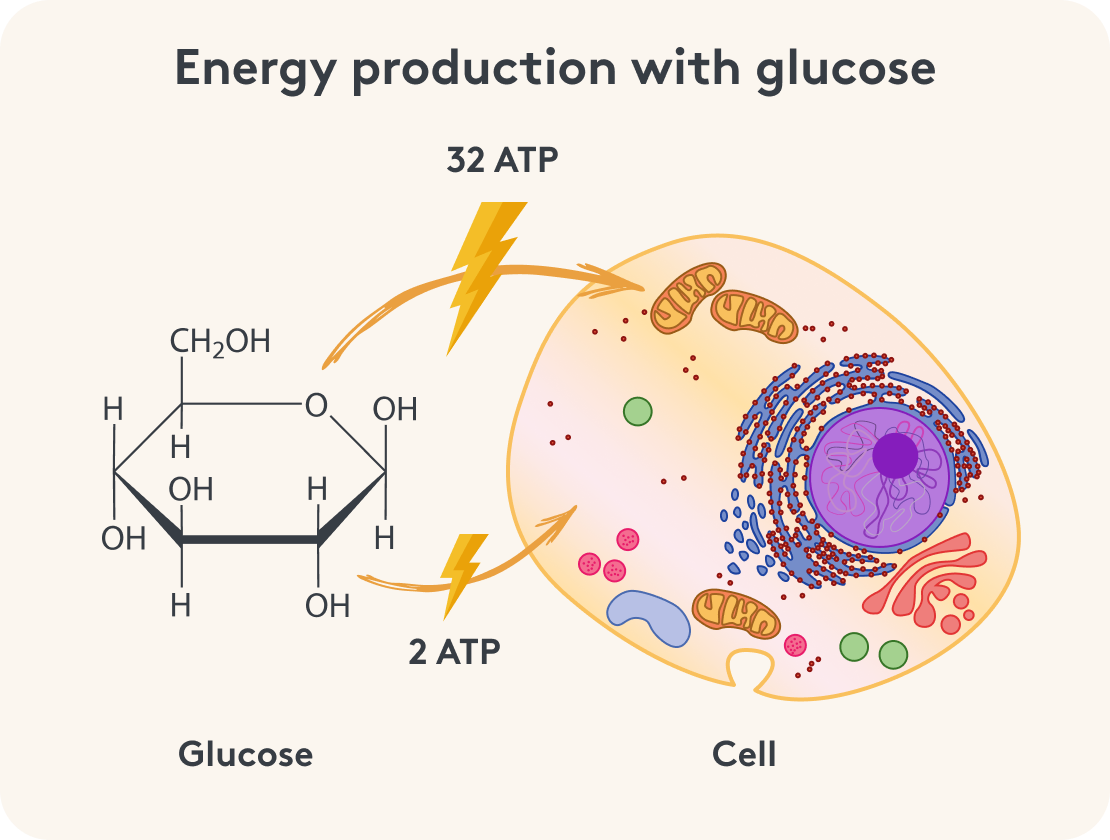

However, in various diseases such as mitochondrial disorders , cancer, and chronic infections, the fermentation pathway can become a curse. Diseased cells often use this pathway to avoid cell death (apoptosis).³
What happens in the body with sugar?
The bloodstream supplies your cells with sugar, which must first be absorbed. As the intestine can only absorb simple sugars, all other sugar compounds and complex carbohydrates are broken down with the help of enzymes. In some cases, this enzymatic breakdown begins in the mouth.
Here's a little experiment for you to test this out: chew a piece of bread for a few minutes and you'll notice that it suddenly tastes sweet. This is due to the enzyme amylase, which is contained in saliva.
Most long-chain sugar compounds are broken down in the small intestine by the enzymes contained there. After the breakdown of carbohydrates from pasta, bread, potatoes or rice, individual glucose building blocks remain.
The organism uses specific enzymes to break down the disaccharides, such as lactase for lactose, maltase for maltose and trehalase for trehalose. The digestive tract absorbs the resulting monosaccharides and converts them into glucose before releasing them into the bloodstream.
Good to know: The glucose contained in the blood is called blood sugar.
How sugar affects blood sugar and insulin levels
Both the blood sugar level and our insulin level rise and fall with the intake of meals. All carbohydrates in the form of sugar, fructose, starch etc. influence the blood sugar level, which rises with their intake. The glucose is then transported into our cells with the help of insulin and the blood sugar level falls again.
The glycaemic index (GI) gives you an indication of how foods affect your blood sugar level on a scale of 1 to 100, with glucose with a value of 100 serving as a comparison. A low GI therefore indicates a slow and low rise in blood sugar levels. The value always refers to 50 grams of carbohydrates contained in the food and does not take into account the composition of individual ingredients.
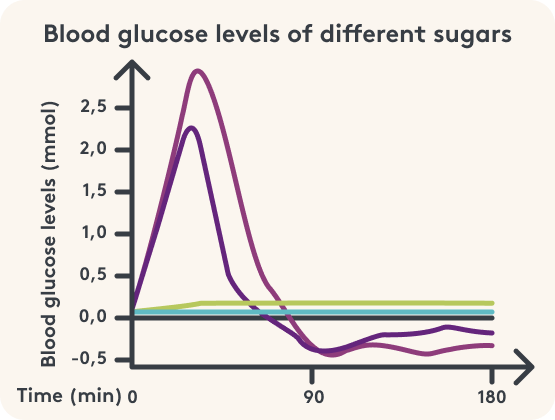

Why do we need sugar?
Cutting down on sugar and calories does no harm at all. However, there are good reasons why you shouldn't cut out sugar completely.
+ Sugar is an important source of energy
The body constantly needs energy. To release it, it uses glucose as fuel. The brain and nerves also love sugar: The brain alone burns an average of 142 grams of glucose per day, equivalent to about 14 tablespoons of sugar. Muscles also need quick energy in the form of glucose. Its advantage over fatty acids is that it can be used as an energy source in two different ways : combustion and fermentation. Fermentation is particularly beneficial during exercise.
+ Sugar makes you happy
Your mind rewards you when you eat sugar. The brain triggers the release of endogenous opioids and the happiness hormones serotonin and dopamine via the taste buds.
In addition, high levels of sugar stimulate nerve cell activity in the brain. This leads, among other things, to a more intense perception of pleasant sensations. This reward system is the reason we enjoy eating sugar so much.
Tip: You can learn more about how the gut and brain work together in our article on the gut-brain axis
+ Sugars are important cell building blocks
Some sugars are important components of our cell structures. These include ribose, which is part of the DNA strand and the energy molecule ATP. Galactose, together with proteins, forms glycoproteins, which are responsible for, among other things, the exchange of information between cells and the reception of hormone signals.
+ Sugar helps with stress
Our brain cells require a particularly high amount of energy when they have to work intensively and quickly because they are under stress. Sugar not only serves as fuel, but can also reduce stress in the form of cortisol . Consuming sugar in a stressful situation in which a lot of cortisol is released has been shown to lower cortisol levels. This could explain why stressed people often have an increased craving for sweets.⁴
Sugar as a risk factor: why high sugar consumption can make you ill
Sugar was important for the survival of your ancestors, but was only available in small quantities. Today, however, it is an art to eat meals without sugar. The large oversupply and the associated increase in sugar consumption can lead to health problems.⁵
One known danger of too much sugar is obesity. This is because sugar contributes to the formation of fat, which the body stores when there is too much of it.⁶ There is also a risk of developing type 2 diabetes.
However, too much sugar can also have negative effects on people, some of which go undetected for a long time. For example, the gut can become unbalanced as “bad” gut bacteria gain the upper hand. Tumor cells are also “fed” by sugar.
Other symptoms are:⁷
- Addictive behavior
- Attention deficit and hyperactivity disorders
- Impairment of neurocognitive functions (spatial thinking, object recognition, behavioral inhibition, anxiety memory)⁸
- Sleep problems
- Skin problems
Would you like to learn more about sugar?
That was part 1 on the topic of sugar and sugar metabolism.
Do you want to reduce your sugar intake and avoid extra calories? Sugar alternatives can help you do this. However, not every sugar substitute is automatically good for your well-being.
In our article on sugar alternatives, you can find out what you should bear in mind with sweeteners, what amounts of sweeteners or fructose are good for you and what functional sugars are all about.
Bibliography
- ble.de/SharedDocs/Pressemitteilungen/DE/2024/240207_Zucker.html
- Dr. Johannes Coy. 2019. Fit mit Zucker. GU Verlag.
- Lu, J., Tan, M., & Cai, Q. (2015). The Warburg effect in tumor progression: mitochondrial oxidative metabolism as an anti-metastasis mechanism. Cancer letters, 356(2 Pt A), 156–164.
- Ulrich-Lai, Y. M., Ostrander, M. M., Thomas, I. M., Packard, B. A., Furay, A. R., Dolgas, C. M., Van Hooren, D. C., Figueiredo, H. F., Mueller, N. K., Choi, D. C., & Herman, J. P. (2007). Daily limited access to sweetened drink attenuates hypothalamic-pituitary-adrenocortical axis stress responses. Endocrinology, 148(4), 1823–1834.
- Freeman, C. R., Zehra, A., Ramirez, V., Wiers, C. E., Volkow, N. D., & Wang, G. J. (2018). Impact of sugar on the body, brain, and behavior. Frontiers in bioscience (Landmark edition), 23(12), 2255–2266.
- usz.ch/fruchtzucker-und-fettproduktion/
- everydayhealth.com/diet-nutrition/potential-signs-youre-eating-too-much-sugar/
- Beecher, K., Alvarez, Cooper I., Wang J., Walters, S. B., Chehrehasa, F., Bartlett, S. E., Belmer, A. (2021). Long-Term Overconsumption of Sugar Starting at Adolescence Produces Persistent Hyperactivity and Neurocognitive Deficits in Adulthood. Frontiers in Neuroscience, 15.





